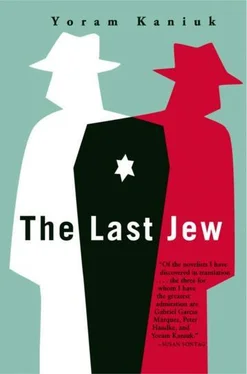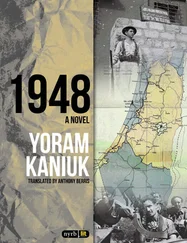So when, maybe too late, I noticed the garden being cultivated next to my house, when I saw a new rake, a new ladder, a hose, young virgin foliage and a sprinkler spinning, maybe then something penetrated my consciousness even though consciously, maybe as a defense from something I was afraid of, I started working our garden and some audacious sickness, certainly not acute, poured into me intoxicating letters of what I could have read by myself if only I dared: furtive bliss, bliss stemming from the fact that for a long time I hadn't yet succeeded in hating the garden because of the nothingness of my son. My wife then said to me: Obadiah, what are you trying to do in old age? You'll start knocking nails for me and knowing how they hang pictures on a wall, Obadiah, said my wife, you're too old to be a human being-that she said now with a wickedness that even she herself felt but couldn't stop herself, you'll start learning to long for your son without the whole world knowing it, she added with a kind of poison of love, maybe you'll even learn how to take out the garbage without spilling half on the floor and you'll learn how to make children who live and don't die. Much as her words pained me, especially the last ones, I knew it wasn't at me that she aimed her anger and even she herself was sorry for her words and she said: The department of dead children is me, you just watered gardens, children, a new nation, empty rhetoric, and my thirsty body. I saw her, I looked at her sad eyes. And with a solid longing that lodged in me from the first day I saw her, her little body wrapped in skin soft as down, her limbs that haven't grown old but only softened with the years, her frightening orphanhood, and I said: Not everything is locked, Hasha Masha, and I went outside, I meant love, maybe hate. I ripped up some crabgrass. I started tending a garden in my old age. I stood there, I knew she was looking at me, I thought of the album, of the photos of the trip to Caesarea that her innocent eyes see through the binding of the album now closed forever, I thought of her inability to really hate, I contemplated the bright but blurred photo of the tour, the picture of Caesarea, a few children in bathing suits, rocks, an older girl with a wet skirt clinging to the hard body and to identify him and Menahem's face in the middle of the photo, his hands held out to the sides, oxygen ate part of the picture, and his hands are trying to embrace the world with a love that maybe really did lodge in him, for life, for the garden, for Noga, for the sun, and for the sea and he's there linked to his mother's words, not mine.
And so I discovered that the Giladis had disappeared and no longer lived next door to us. Together we moved here, together we built our houses, together we had children, Amihud their son and Menahem our son play with one another, and then they fly kites and frolic in the bamboo nests they called boos and look at the sea and swim. Here we came to live as a national mission, to conquer another square of land for the nation, here in the far north then, cut off, and now it's become part of a city with many gigantic hotels and shops and cafes and restaurants. Giladi was an official in the company to prepare for settlement and bought land all over Israel from the old and spoiled effendis in Beirut or Damascus for the institutions and he'd run around on his big motorcycle and there was always some big secret on his face that he couldn't reveal and after Menahem's death, the Giladis stopped coming and if they did come they felt uncomfortable and fled, and so ties slackened and we were also cut off from other people we knew and new ties were made that were essential, at least to me, and even Amihud stopped coming and I dimly remember that he invited me to his wedding or maybe some other event, and I couldn't go and then we didn't see each other anymore and now I discover that they're not here anymore and I didn't notice that they had moved. And I thought, funny how people cut themselves off. The place took on a new form. The gardens I had de stroyed in my mourning, the Giladis whose secrets I had long ago not tried to decipher in meandering conversations with Mr. Giladi, Ben-Yehuda Street where I walk every morning is changing, tourists come to photograph ruins, couples in cars on the seashore, petting or perhaps even copulating, and Berla's kiosk has closed, the huts of the youth movement have disappeared, and the sands have been concealed under the impetus of hotel building and only Singer's little shop with an old sign advertising a brand of cigarettes they don't make anymore is still here, and the sign hangs in the salty sea air, rusted, groaning when the wind blows in winter, cobwebs of an old man who was once the first one to wrap food in clean parchment paper and not in newspaper, and we're left an abandoned island next to the closed port and in the grocery they confirmed it, yes, a strange new neighbor lives there, a refugee they told me. Comes to the store, buys, is silent, and goes, always dressed for the theater, Singer's son told me, dragging a crate of eggs from the pickup truck on the sidewalk, cartons of eggs in a crate, like all of us, and so I paid attention to the garden that put an end to some gnawing grief, some misery we all felt but didn't talk about, and there was fertilizer there and suddenly piles of red loam and planting grass and you just don't see who does it, he's solitary as a thief at night and working when everybody's sleeping maybe afraid of being seen and I work my garden and my garden starts touching his garden and a kind of union is created here, I fix and somebody else fixes, I uproot crabgrass and suddenly the street is full of uprooted crabgrass and who the man is, I didn't know then.
And so we met, Ebenezer and I. When the pine tree looked green and fresh and the bougainvillea started blooming and the piles of sand disappeared and the new lawn was planted and looked green and soft and mowed and the geranium bushes started blooming I was filled with a kind of pleasure, a plea for far-off days and the tombstone around my house was shattered and my body stood erect, even my face took on color and at night I could sleep from fatigue, and in my mind's eye I saw Menahem running around in the garden I had planted for him, as if life has cycles and there's a return from death, and he pushes a wheelbarrow as if it were a train and goes toot toot and then I saw the walls of my house peeling and I bought paint to paint them and I fixed the roof tiles and a carpenter came and fixed the windows and I stretched new screens and I cleaned the gutters and I made a new gate and I put Menahem's wheelbarrow next to the new faucet and my wife refused to go out to see and peeped out the window, and who knows, maybe she smiled to herself, and I wanted to hug her and she avoided me with an almost virginal laugh of an old woman, and she even said: So what, Menahem will grow up in you to be a gardener. And she tried to wipe away invisible tears and ran to our room and I didn't say a thing, but then I saw my neighbor, he was pruning a rosebush that almost touched a vine that started preening wildly on the trunk of the cypress that looked green again and not dusty.
It was summer then, perhaps late summer, because of the heat I took off my shirt and stayed in my undershirt. A nice smell of a watered garden stood in the air, the cool of evening stood in the dark sky, and he stood also in an undershirt but without the cap I wore and I saw how blasted and white his body was, as if a dangerous malediction lodged in him, and yet in his behavior, the way he pruned, the way he measured and plucked tendrils, there was some authenticity, some solid standing on the ground that was his, surely this is how a person prunes a garden he longs for and is rooted in, this is also how a person hates his garden and this is also how he loves it, I was amazed at those phrases but they echoed in the back of my mind. We stood there, two old men, watering gardens, who just a while ago were tense, maybe we were safeguarding something, getting to know one another through gardens, through our almost naked bodies, each one holding the strong flow of water like mighty gods trying to make the harsh and obstinate earth fertile, I thought about the man's fractures, what holds him together, I could see myself, an old teacher, looking like somebody who stood for many years in front of children, teaching them why they would have to die, and behind me the pictures of Herzl, Ben-Gurion, Berl Katznelson, and Weizmann repeating Zionism that the children later realize on memorial walls that took the place of the pictures of the leaders and here he belongs and yet as if he belongs, to those same echoes that made me send Menahem from his first year to war, so those fractures would have a place in the sun, I thought about Tel Aviv, from here it looks like a city joined together obstinately and innocently, half its name Tel, mound, a place where cities are buried and discovered after thousands of years, and half its name, Aviv, spring, is blossoming, blossoming of what? I thought about a line from the words of the Last Jew, he quoted the Yiddish poet Itzik Manger on one of those tapes, who said: When they buried the last of the Gypsy kings, thirty thousand violins came to play on his grave and I thought of what he said, what he quoted from some person who may have breathed his last right after he said that, and Itzik Manger surely meant that he was the last of the violinists playing on the grave of thirty thousand Jewish kings. And at that moment each one of them turned into two-fifths of a cent.
Читать дальше












